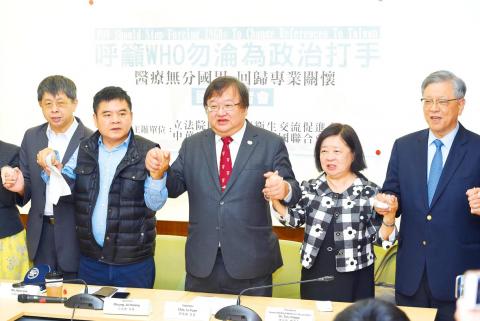The WHO should resist pressure from Beijing and stop asking international medical non-governmental organizations (NGOs) to change Taiwan’s designation to “Taiwan, Province of China” or “Taiwan, China,” on their Web sites and their documents, Democratic Progressive Party (DPP) legislators and local medical groups said yesterday.
DPP Legislator Chiu Tai-yuan (邱泰源), who is also president of the Taiwan Medical Association, told a news conference in Taipei that there have been been several incidents involving the WHO forcing international medical NGOs to change the nation’s designation or face termination of official ties or collaborations with the WHO.
“The WHO, as a healthcare organization, should not capitulate to China or any other nation,” Chiu said. “It concerns us deeply that the WHO would order all international NGOs to change Taiwan’s title, which has compromised its mission and vision.”

Photo: Liao Chen-huei, Taipei Times
The move is especially ironic as WHO Director-General Tedros Adhanom’s statement on the WHO’s Web site reads: “I envision a world in which everyone can live healthy, productive lives regardless of who they are and of where they live,” Chiu said.
“We would like to firmly request that the WHO not allow any political influence to get in the way of healthcare,” he said. “Taiwan has internationally acclaimed medical capabilities and has been an active participant in international disaster relief missions.”
Federation of Medical Students in Taiwan (FMSTW) president Huang Hsu-li (黃序立) said his federation in January found that the nation’s name had been changed from “Taiwan” to “Taiwan, China” on the Web site of the International Federation of Medical Students’ Associations (IFMSA), of which the FMSTW is a member.
When FMSTW representatives protested the designation change at a meeting of the IFMSA in Egypt this month, they were told that the change was made after the IFMSA faced pressure from the WHO, which said that if it did not make the change it would end all collaborations, he said.
The FMSTW plans to respond to the issue by launching a bid to host next year’s IFMSA meeting in Taiwan, so that international medical students can visit the nation and see what kind of place it is, he said.
The forced changes to Taiwan’s designation expose how China really treats Taiwan in the international arena, said DPP Legislator Lin Ching-yi (林靜儀), a former physician.
China’s “united front” tactics are like luring an animal with a few grains of rice before netting and slaughtering it, which is “despicable,” Lin said, calling on the WHO not to bow to Beijing’s “dirty tricks.”
Taiwan has made excellent contributions to the world with its medical competency, such as helping to curb the spread of pandemics, and it should not be excluded from the international community, said DPP Legislator Chen Chi-mai (陳其邁), also a former physician.
Changing Taiwan’s title or depriving it of its right to participate in international medical events is not only unfair, but it also runs counter to the universal value of healthcare as a basic human right, Chen said.

The Central Election Commission has amended election and recall regulations to require elected office candidates to provide proof that they have no Chinese citizenship, a Cabinet report said. The commission on Oct. 29 last year revised the Measures for the Permission of Family-based Residence, Long-term Residence and Settlement of People from the Mainland Area in the Taiwan Area (大陸地區人民在台灣地區依親居留長期居留或定居許可辦法), the Executive Yuan said in a report it submitted to the legislature for review. The revision requires Chinese citizens applying for permanent residency to submit notarial documents showing that they have lost their Chinese household record and have renounced — or have never

A magnitude 5.6 earthquake struck off the coast of Yilan County at 12:37pm today, with clear shaking felt across much of northern Taiwan. There were no immediate reports of damage. The epicenter of the quake was 16.9km east-southeast of Yilan County Hall offshore at a depth of 66.8km, Central Weather Administration (CWA) data showed. The maximum intensity registered at a 4 in Yilan County’s Nanao Township (南澳) on Taiwan’s seven-tier scale. Other parts of Yilan, as well as certain areas of Hualien County, Taipei, New Taipei City, Taoyuan, Hsinchu County, Taichung and Miaoli County, recorded intensities of 3. Residents of Yilan County and Taipei received

Taiwan has secured another breakthrough in fruit exports, with jujubes, dragon fruit and lychees approved for shipment to the EU, the Ministry of Agriculture said yesterday. The Animal and Plant Health Inspection Agency on Thursday received formal notification of the approval from the EU, the ministry said, adding that the decision was expected to expand Taiwanese fruit producers’ access to high-end European markets. Taiwan exported 126 tonnes of lychees last year, valued at US$1.48 million, with Japan accounting for 102 tonnes. Other export destinations included New Zealand, Hong Kong, the US and Australia, ministry data showed. Jujube exports totaled 103 tonnes, valued at

BIG SPENDERS: Foreign investors bought the most Taiwan equities since 2005, signaling confidence that an AI boom would continue to benefit chipmakers Taiwan Semiconductor Manufacturing Co’s (TSMC, 台積電) market capitalization swelled to US$2 trillion for the first time following a 4.25 percent rally in its American depositary receipts (ADR) overnight, putting the world’s biggest contract chipmaker sixth on the list of the world’s biggest companies by market capitalization, just behind Amazon.com Inc. The site CompaniesMarketcap.com ranked TSMC ahead of Saudi Aramco and Meta Platforms Inc. The Taiwanese company’s ADRs on Tuesday surged to US$385.75 on the New York Stock Exchange, as strong demand for artificial intelligence (AI) applications led to chip supply constraints and boost revenue growth to record-breaking levels. Each TSMC ADR represents